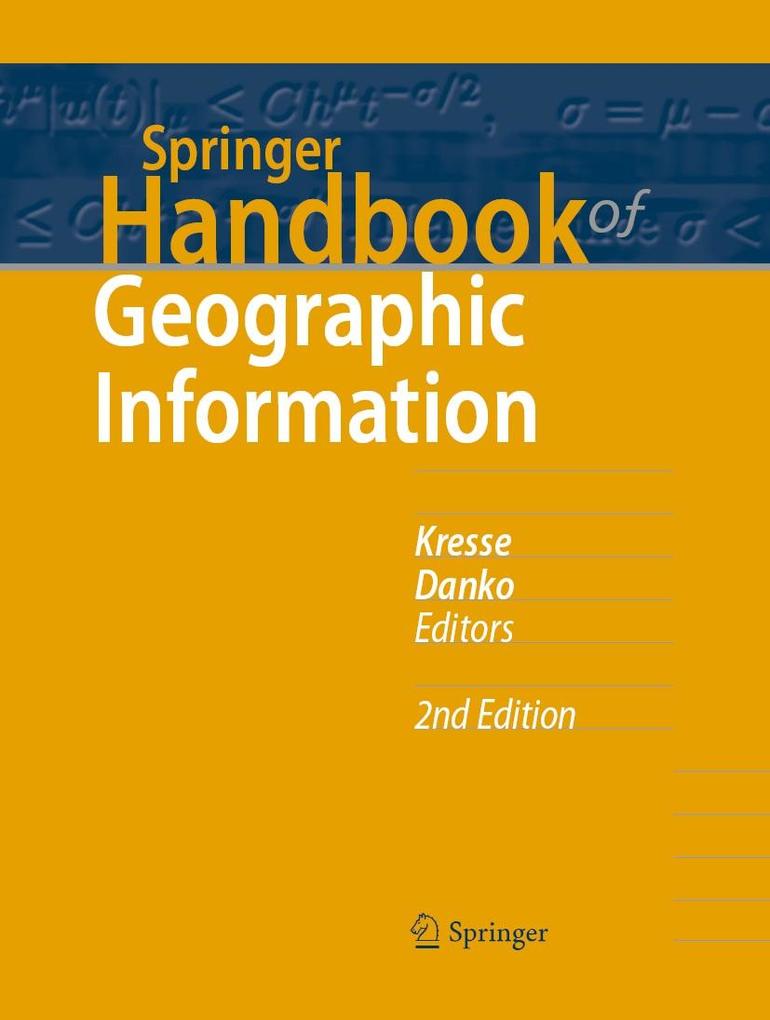
This handbook provides an exhaustive, one-stop reference and a state-of-the-art description of geographic information and its use. This new, substantially updated edition presents a complete and rigorous overview of the fundamentals, methods and applications of the multidisciplinary field of geographic information systems. Designed to be a useful and readable desk reference book, but also prepared in various electronic formats, this title allows fast yet comprehensive review and easy retrieval of essential reliable key information.
The Springer Handbook of Geographic Information is divided into three parts. Part A, Basics and Computer Science, provides an overview on the fundamentals, including descriptions of databases and encoding of geographic information. It also covers the underlying mathematical and statistics methods and modeling. A new chapter exemplifies the emerging use and analysis of big data in a geographic context. Part B offers rigorous descriptions of gathering, processing and coding of geographic information in a standardized way to allow interoperable use in a variety of systems; from traditional methods such as geodesy and surveying to state-of-the-art remote sensing and photogrammetry; from cartography to geospatial web services. Discussions on geosemantic interoperability and security of open distributed geospatial information systems complete the comprehensive coverage. The final part describes a wide array of applications in science, industry and society at large, such as agriculture, defense, transportation, energy and utilities, health and human services. The part is enhanced by new chapters on smart cities and building information modeling, as well as a complete overview of the currently available open-source geographic information systems.
Using standardized international terminology, in accordance with ISO/TC 211 and INSPIRE, this handbook facilitates collaboration between different disciplinesand is a must have for practitioners and new comers in industry and academia.
Inhaltsverzeichnis
Part A Basics and Computer Science:.-
Modeling of Geographic Information.- Mathematics and Statistics.- Databases.- Encoding of Geographic Information.- Big Data Analytics.-
Part B Geographic Information:.-
Geographic Information Systems (GIS).- Change Detection.- Geodesy.- Data Acquisition in Geographic Information Systems.- Remote Sensing.- Surveying.- Geometry and Topology.- Cartography.- Geospatial Metadata.- Standardization of Geographic Information.- Geospatial Web Services.- Geosemantic Interoperability and the Geospatial Semantic.- Registration of Geospatial Information Elements.- Security for Open Distributed Geospatial Information Systems.-
Part C Applications:.-
Cadastre.- Building Information Modeling.- Location Based Services.- Marine Geographic Information Systems.- Geographic Information Systems in Agriculture.- GeographicInformation Systems in Defense.- Geographic Information Systems for Transportation.- Geology.- Geographic Information Systems in Energy and Utilities.- Geographic Information Systems in Health and Human Services.- Open Source Geographic Information Systems.- Smart Cities.
Produktdetails
Entdecken Sie mehr
Bewertungen
Es wurden noch keine Bewertungen abgegeben. Schreiben Sie die erste Bewertung zu "Springer Handbook of Geographic Information" und helfen Sie damit anderen bei der Kaufentscheidung.









